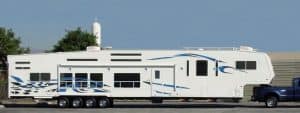
Buying a RV? How long is the IDEAL length…
RV length when buying a RV is a topic near and dear to my heart! I’ve been full-timing (living full time) in a 5th wheel since late 2011. Personally, I just downsized from a 38′ 2″ (real length) fifth wheel to a 34′ 11″ 5er. And… already its made a difference.
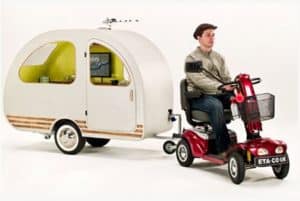
The battle begins on the RV sales lot…
You’re “out there” on the sales lot with a sales consultant (I’ve been there many times as that is what I do all summer!) and you’re looking at trailers (5th wheel and/or “bumper pull”). Those super sized long trailers sure look nice – on the dealers lot – but what happens when you drive it off and want to get into a state or National Park? National Forest Service or Bureau of Land Management land? Well…
***Buying a Camper? Save TIME, MONEY, and AGGRAVATION – How?
Check out our Concierge RV Buying Service HERE***
Some (many) parks have size limits when it comes to RV’s…
There are places in our nation – and its often the most scenic places where the design of the roads and the length of campsites limit the RV length that can safely travel or camp in a particular site. I’ve seen MANY here out west where if you plan to expand your horizon beyond the nearest KOA or Good Sam campground 0.25 miles off the interstate, you’d best be in a (somewhat) shorter camper.
From an article I read here are important stats about RV length and National Parks access…
Want to camp in a National Park? Camper Report dot com reports the following in a very interesting article –
- RVs up to 12′ in length fit in every national park campground in the United States, although there are a few campgrounds that don’t allow RVs at all and are tent only.
- RVs up to 19′ in length fit in 98% of all national park service campgrounds.
- RVs up to 25′ in length fit in 93% of all national park campgrounds
- RVs up to 29′ in length fit in 84% of all national park campgrounds
- RVs up to 32′ in length fit in 81% of all national park campgrounds
- RVs up to 35′ in length fit in 73% of all national park campgrounds
- RVs up to 37′ in length fit in 60% of all national park campgrounds
- RVs up to 40′ in length fit in 53% of all national park campgrounds (Remember that many of the parks will only have a few sites this size, however. Book long in advance if reservations are available–otherwise you run the risk of not having a spot)
- RVs up to 41′ in length fit in 7% of all national park campgrounds (Remember that many of the parks will only have a few sites this size, however. Book long in advance if reservations are available–otherwise you run the risk of not having a spot)
As you can see from the above statistics, if you want to access and camp in roughly 3/4 of all National Parks, you’d better be UNDER 35 ft. Notice how quickly the accessibility drops off as you grow longer than 35 ft. AND… what is true for National Parks, also holds for many other great camping areas. (Again – I’m talking about campgrounds with the BLM, NFS, many states, etc.
The above stats confirm what I tell my own clients who are looking for RV’s – travel trailers over 30 ft and fifth wheels over 35 ft look nice, luxurious, and spacious, BUT, they come at a cost – a lifetime of ownership wondering why you bought a longer camper.

I spend my summers in Wyoming – and here’s another lesson I’ve learned that relates to RV length…
It gets WINDY out here! This is yet another challenge for those pulling any travel trailer over 30 ft long. Travel trailers are particularly vulnerable to mishaps on the road when the wind is howling. Yes, its true, unless you go for a unique floor plan like the Jayco Jay Feather X213 or 23MBH, you will not get a couch in a shorter trailer with bunk beds, but, you will get something that can get into more places and get there more safely than a “giant sail” like a 35 or 40 ft travel trailer hanging onto your bumper!
When it comes to fifth wheel lengths…
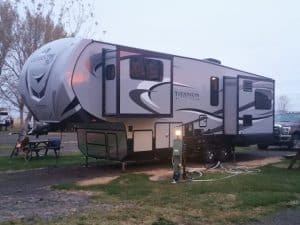
Pulling a fifth wheel is most definitely more stable than a travel trailer. Put simply, its nice to have that king-pin over the rear axle! So… a bit more length is ok – but as the chart above shows, there ARE limits! When I switched to my Outdoors RV Glacier Peak 5th wheel, I did so, not just because of the quality of the trailer, but its length was “just right” (34 ft 11 in) to allow for sufficient living space and dual-opposing slides didn’t hurt!
*********My Personal BEST recommendations for “Must Have” RV Accessories*******
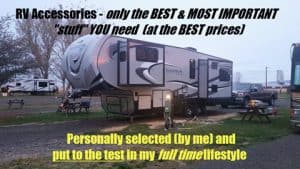
************************************************************************************
When it comes to ideal RV length, here are some important questions to consider…
- How are you planning to use your camper? (Full time? Weekends only? Something in between?)
- If you plan to full time (or spend weeks at a time in it) – you’ll need storage space for clothes and “stuff” – bear this in mind as you search for the ideal camper
- Will you be traveling through regions where you’ll spend much of your time outside – or will you be spending significant amounts of time inside?
- In the case where you’ll be inside for long periods of time, bear in mind, slides would be important to open up the floor space and length should be near the max for the campgrounds you plan to visit
- Will you need bunk beds?
- If so, they take up space better used in other ways – so get them ONLY if you have folks (kids?) who will be traveling with you much of the time.
- Bunk models often require more length than non-bunk models – but not always. In 5th wheels (for example), you can get new Jayco Eagle trailers with overall lengths under 35 ft that include bunks, but if you want a “bunk room” (a separate room for the bunks with a door that separates the bunks from the rest of the trailer), your length will likely have to be at least 37 ft. (again – bumper to hitch, NOT the number on the door!) Incidentally, I AM a fan of the Jayco Eagle 5th wheel trailers – well built, not too pricey, good “fit and finish”.
- Do you need to retain full use of your truck’s bed? If so, a travel trailer is for you!
- Will you be wanting to camp in remote locations – those that will be the most challenging to reach and perhaps have shorter campsites – or – will you be pulling off the highway and searching for the nearest private campground with 70+ ft. sites?
When it comes to ideal RV length, here are some specific thoughts and insights from Al…
- Length is a starting point when you consider what to purchase, but so is quality. I personally ALWAYS consider quality of build over the “ideal floor plan” or “bells and whistles”.
- Yesterday I had a gentleman ask about bumper pull trailers with bunks – and wanted the bunks to have flip down televisions. I explained that any RV service center can add that feature “after market”, but if a manufacturer is building that at the factory, they’re likely doing it to grab your eye when you look over the camper – and the skeptic in me asks “while they are diverting your attention to flip down tv’s in the trailer, what important feature did they skip?”
- Before you ever enter a camper, do you look around the outside of the camper and ask this…
- What kind of tires are they using? (Many use the cheapest junk they can find)
- Is there a metal plate separating the tires from the interior of the camper? (I personally had a tire blow out, shred and then rip itself into the camper above and do LOTS of damage to the plumbing & wiring.)
- Are there shocks on the axles? (Consider this – are you going to be traveling at all off-road? Might there be “bumps in the road” that shocks will act to protect the camper?)
- How is the underside of the slide constructed? (Is it fiberglass? (best) or some type of material that will crack and fail over time – exposing the interior construction to the outside elements
- Always consider quality of build and length as MAJOR factors in your purchase – well before focusing upon floor plan and “cute” features like outside kitchens and flip down tv’s in bunks! I’ll go as far as to say this – MANY trailer manufacturers are making a product I’d never purchase. Want specific advice? Contact me privately.
-
Need assistance getting the BEST camper at the RIGHT price? You may find value in my Concierge Buying Service HERE. (Basically you get ME as your “guide by your side” ensuring you get the best deal possible – and avoid the MANY pitfalls that occur when purchasing – thus saving TIME, MONEY, and AGGRAVATION.)
****Whatever you purchase… you also need an Extended Service Contract – read HERE to learn why****
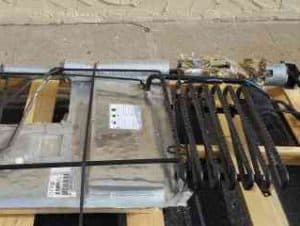
An interesting side note…
Here in Wyoming, Yellowstone National Park limits trailer length to 30 feet. How do they know your trailer length? Well… what they do not do at the entrance to the park is take out a tape measure and check the “bumper to hitch” length. Instead, they simply rely upon the number next to your door. Mine is a “30RLS” – my trailer is therefore treated as a 30 footer… pretty simple, huh?
Bear this in mind as you search for the “perfect camper” for yourself. And while you’re looking – realize that MANY RV manufacturers leave MUCH to be desired in their build quality. If you visit my other posts on this site, I talk about some manufacturers whom I respect. You are also welcome to contact me privately and I’ll help you narrow the field – my email is tr******@*************ca.net.
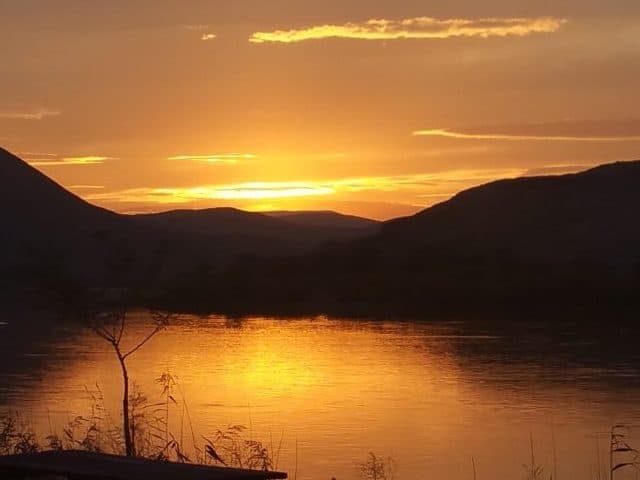
What is a good smaller travel trailer (15 to 20 ft)? Something for campgrounds as well as some off road and that won’t break the bank.
Liz,
It truly depends upon “what breaking the bank” means. I’d start with USED; and it depends upon your tow vehicle, your budget, your needs as far as how many it has to sleep; and whether you’re planning to use it in cold weather or not. Feel free to call me at 307 269 2546 – we can discuss further and I can suggest. I also offer a Concierge RV Buying Service – detailed here… rvAcrossAmerica.net/buysell Al
What would be the 2 recommended travel trailer brands in the 25 to 30 ft range. Every thing I have read says don’t buy these, buy these. Both lists are seemingly the same.
Jeremy,
Hands down the answer to your question is Outdoors RV and Arctic Fox. To assess the validity of the advice you’re receiving, you have to look at who the advisor is and to whom they have “sold their soul.” You can see about me and my Concierge RV Buying Service at rvAcrossAmerica.net/buysell – you’ll find that I have NO commitments to ANY manufacturer and that my recommendations are SOLELY designed for the betterment of my clients. Feel free to call me at 307 269 2546 to discuss further. Al
It’s great that you mentioned that getting a fifth wheel is much better than purchasing a travel trailer. I also find it helpful that you said I should get one under 35 feet to ensure I would be granted access to camp in National Parks. My husband and I are planning to purchase an RV, so thanks for this!
Levi,
Thanks for your kind words. I do offer a Concierge RV Buying Service that can help ensure you get the right camper at the best possible price. Details here – https://rvacrossamerica.net/buysell
Alan Sills
Alan, We are new to RV camping and in the market for a travel trailer. We like the floor plans of the Cherokee Alpha Wolf, Embrace Ultra Lite, Rockwood Ultra Lite, Jayco Jay Flight SLX and Keystone Cougar.
We are researching the construction but some have limited information available on line. Based on the options above, are you able to provide any insight on which manufacturer builds a better product?
Josephine,
May I respectfully select “none of the above”? Your list of campers under consideration is a mix of Forest River & Thor brands (these are the 2 companies that control much of the rv trailer market.) All are built with VERY LOW standards. There ARE far better choices available to you. Allow me to learn a bit more about your wants/needs and budget before I make suggestions. I would invite you to call me (307 269 2546) so that we can speak for a few minutes so I can be of greater assistance to you.
All the best,
Alan Sills (ps – I’m emailing you privately as well to ensure you receive this.)
Hi Alan, your information is great and helpful! We have traded a fifth wheel and are considering trading our Class C for a Bumper Pull, but want one that will fit into our driveway. Since of course we only see the “biggies” such as Thor and Forest River, your response intrigued me that there ARE better brands out there. Quality before Quantity for sure! If we do park in our driveway we are restricted to 28.5 feet including tongue, but will consider storage. We liked the Cougar 22RBS but are afraid it will be too small inside, but it fits outside!
As I said, your insights on other Brands would be terrific! I will wait to hear from you, don’t want to “invite” myself to call you!
Debbie and Matt
Debbie and Matt,
I do believe a phone call would be appropriate (307 269 2546) as I have several questions. Trading your Class C may or may not make sense (vs. selling it outright.) As far as travel trailers go, Cougar’s LOOK nice – but – that’s about where it ends. There are far better quality manufacturers to consider. Alot will depend upon your budget. A few names I have great respect for include Outdoors RV, Arctic Fox and Lance, but without knowing your wants, needs, budget, intended use, etc. I’m just tossing out names at the moment.
Alan Sills
Any idea how the National Parks come up with limits like 27′ RV or trailer in a site.
They often use the same size for RV and trailer.
Obviously a trailer will also have a tow vehicle.
If it was a site length limit it would have to be double wide to handle the the tow vehicle.
Or does that imply a maneuverability issue?
In our “home” park Yosemite we have walked all the loops and noted where we can fit our 25′ trailer.
Due too over hang of parking stops, unhooking and over lapping the tongue with the truck we have found numerous sites that we fit in that recreation.gov says we are too long for.
In general, it refers to the length of the camper (regardless of type of camper). Remember, national parks are a government entity, so it is government workers establishing these limits – and they’re not likely to be rv’ers themselves. So… yes, the figures are not always accurate. The simple reality is, when you get over 35 ft, the majority of np camping sites will NOT accommodate you.
Al
I really appreciate your comment & advise on rv length. We are wanting to go full time when I retire in 1 1/2 years. Had a bumper pull in the 80’s, no campers since. Interested in your advice on RV width. Many i see are 101″ wide which appears to be restricted to interstate in several states. Should i try to stay with 96″ wide (legal everywhere). And what 5th wheels do recommend in this width?
The width issue out here in Wyoming is not a big deal, so, I’m not as dialed into it. I do know that many toy haulers, notably Fuzion & Raptor are 101″ wide and generally they are not bothered by police for being over-spec. Most 5th wheels are 96″ – frankly, 5″ doesn’t matter all that much. What I find far more important is “dual opposing slides” in the living area – this creates the most living space. Its about 13-14 ft. wide in that portion of the trailer with the slides out – so adding 5″ doesn’t change much. When you’re ready, if you wish to avail yourself of my Concierge Buying Service, please contact me after reviewing rvAcrossAmerica.net/buysell to learn more about it. Al
Al, first off thanks for advice & opinions on this link. We’re interested in upgrading from a 27 ft bumper trailer to a 5th wheel to do some part time (maybe full time) RVing in the near future. Currently were doing our first 2 month long trip to escape the rain, slush, mud & break up of our home in northwestern MT and this will be our first test of part timing. In the future we would like to take a few months and travel back roads America and see the real country & people. We’re also upgrading from our ’99 Dodge 2500 to a used 2011 Dodge 3500, which I know will increase our options. We’re concerned with the best length & after reading your info here we’re thinking something around 35 – 38 feet might be appropriate. Also We’ll be down sizing our home within the next 5 years and the wife is talking about have a property of our own to park the RV on & live in it full time. I’m not so sure. ( Maybe if we could park it next to a big existing deck & extra living space structure. Your thoughts & advice?
I’ll be glad to offer advice. Please call me ON or AFTER 3/26 between 7-9pm Mountain Time and with some additional info I can get specific. I’ll be asking about your current camper; budget to spend; and a bit more about your wants and needs. You can reach me at 561 676 1205. Al
I like that you talked about the importance of slides when you plan to spend a significant amount of time in your RV to make sure that you can open up its floor space and length. This is an important tip for my father because he’s planning to buy an RV that he can use for camping. He said that he wanted his RV to be a good place when he needs to camp for a few days, so I’ll be sure to share your blog with him.
Thanks for your kind words Ellen. Tell him to feel free to reach out to me if he needs assistance selecting or locating the right camper for his needs. Have him read/view my “how to buy” series as a start (its a 5 part series). Al
We are considering a 5th wheel to live in when we retire and wait to build a home. I’m so glad I came across your site and look forward to your obvious wealth of knowledge. Thanks so much.
Thanks for your kind words. When you are ready to purchase, feel free to contact me and I can assist. Al
Good stuff to know…looking in buying a fifth wheel when I retire in 4 years. First time RVing
Thanks for your kind words. Feel free to reach out to me at that time. I’ll be glad to assist in your search. Al
Al I was wondering you metioned 30ft max at some parks with a fifth wheel pulling another trailer behind it would thay except it or reject you. Do thay have a compound you can store your tagged alone trailer at I haven’t been out west yet and the wife and I are planning soon
Since you can disconnect the 2nd trailer, I’m sure many campgrounds will allow it. I’d suggest you inquire with each campground you plan to visit.
Are you working this summer at Stalkups in Casper, WY? What’s best number to reach you? I’m a 2-yr full timer looking to upgrade
Currently in a 2014 Jayco Swift SLX 185BH Baja Edition towing with a 2012 Ram 1500 5.7L Hemi.
Yes and call me at 307 269 2546 – its my cell so I can assist at any (reasonable) hour. Bear in mind, its mountain time here.